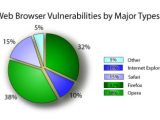The face-off for dominance on the browser market is essentially a four-horse race between Internet Explorer, Firefox, Safari and Opera. Now, the truth of the matter is that Internet Explorer has long become the preferred browser worldwide, starting with the moment it was bundled with Windows and offered for free in order to beat Netscape at its own game. Firefox comes in second in terms of install base, enjoying the backing of Google, with Safari in third place thanks to the Mac OS X and with Opera a distant fourth. But along with market share, security is another relevant aspect of the browser war.
Now, Microsoft has been claiming throughout 2007 that Internet Explorer has the smallest volume of vulnerabilities compared to all rival products. The statistics put together by Jeff Jones, a Security Strategy Director in Microsoft's Trustworthy Computing group, illustrating IE's superiority in terms of the sheer number of vulnerabilities do not offer a true perspective over the actual level of security provided by each browser. But at the same time, the data turned out to be correct, as supported by a recent report from Cenzic.
"Application vulnerabilities in Q4 tracked the first three quarters in terms of their dominance, forming 71 percent, a three percent increase over Q3, of the total 1,404 published vulnerabilities. The scary part is that 70 percent of these vulnerabilities are easily exploitable. Application vulnerabilities are the ones that pertain to Web technologies including Web servers, Web browsers, and Web applications. (...) In the browser category, surprisingly Internet Explorer had less vulnerability than Safari, Opera, and Mozilla Firefox browsers," Mandeep Khera, VP of Marketing, Cenzic.
Cenzic revealed that only 10% of all browser security flaws in 2007 impacted Internet Explorer. The next in line is Safari with 15% and then Firefox with no less than 32% of vulnerabilities. Judging strictly by the number of vulnerabilities, Opera is the most insecure browser, having been impacted by no less than 38% of vulnerabilities.
"Vulnerabilities in Web browsers were concentrated among four popular technologies - Internet Explorer, Mozilla Firefox, Opera, and Safari. Showing a similar trend as Q3 2007, the Opera Web browser with 38 percent had the most reported vulnerabilities during the Q4 time period, with Firefox coming in second by a 6 percent margin. The chart below shows the percentage of the total browser vulnerabilities associated with each product. Unlike previous quarters, less vulnerabilities were reported in Internet Explorer than in Opera, Firefox, or Safari," reads an excerpt from the Cenzic report.

 14 DAY TRIAL //
14 DAY TRIAL // 
